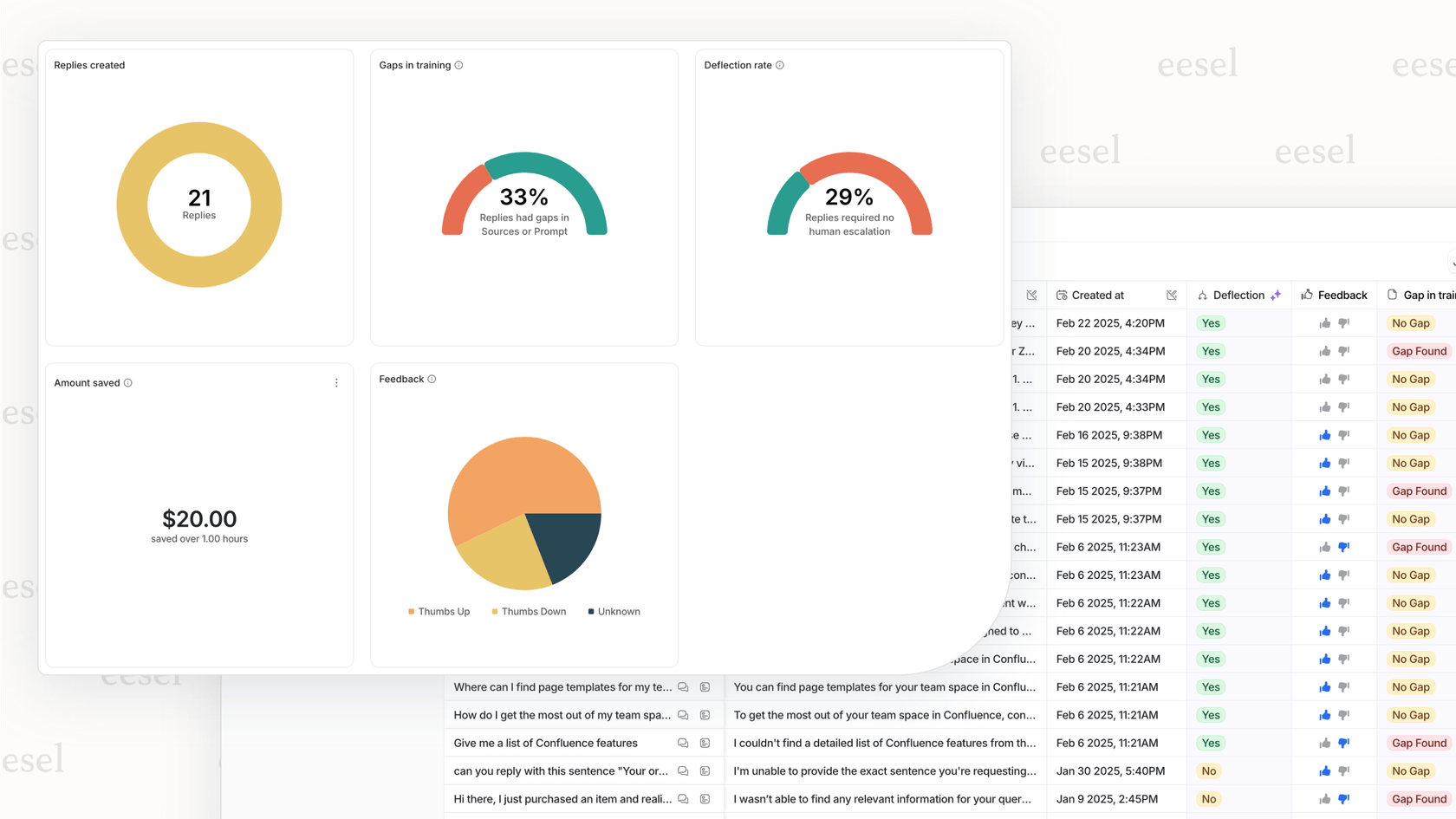9 best Decagon alternatives for AI customer support in 2026

Kenneth Pangan

Katelin Teen
Last edited January 16, 2026
Expert Verified

Customers today expect instant, smart answers. Because of this, companies are turning to AI agents to handle the load, and Decagon AI has become a well-known name in the game. It’s a capable platform that aims to automate customer service with bots that feel almost human.
But here’s the catch: Decagon is a completely separate platform. For a lot of teams, this means either ditching the help desk they already know and use, or trying to piece together complicated workarounds. While Decagon is powerful, it’s not the right tool for every business, especially if you’re looking to improve your current setup, not tear it down and start over.
This guide will walk you through the 9 best Decagon alternatives for 2026. We’ll break down different options for different needs, whether you want something that integrates smoothly, has powerful automation, or just fits a tighter budget.
Decagon alternatives: What are AI customer support agents?
When we talk about AI agents for customer support, we’re not talking about those old, clunky chatbots that could only follow a script. You know the ones, they’d get stuck the second a customer asked something slightly off-topic.
Today's AI agents are a whole different story. They use generative AI and Natural Language Processing (NLP) to actually understand what people are saying, learn from your company's knowledge base, and even get things done. Their goal is to solve customer problems with a bit of what feels like human-like reasoning. They can handle tasks like processing a refund, answering tricky product questions, and knowing when it's time to hand a conversation over to a human. Think of them less like a rigid script and more like a very capable new team member.

Why look for Decagon alternatives?
Decagon has certainly earned its reputation with its powerful generative AI. The platform is built to learn from past customer conversations, figure out what customers want, and take action. It's an impressive bit of technology.
Still, many teams end up searching for Decagon alternatives for a few solid reasons:
-
It’s a standalone platform: This is the big one. Using Decagon often means you have to leave your current help desk, like Zendesk or Intercom. For teams who have spent years tweaking their workflows in a tool they like, switching everything over is a huge headache.
-
The setup can be a hassle: To really make Decagon work for you, you have to feed it the right data and connect it to all your backend systems. This isn’t a quick plug-and-play setup; it can take a lot of time and technical know-how upfront.
-
The pricing isn't for everyone: Decagon’s pay-as-you-go pricing can be great, but it can also be unpredictable. If you need to plan your budget carefully, this model makes it tough to know what you'll be spending, especially when support requests spike.
That's why it pays to check out other options. You might find a tool that does just as much but fits into your current workflow with a lot less fuss.

How we chose the best Decagon alternatives
To put this list together, we didn't just pull names out of a hat. We sized up each platform based on a few things that really matter to support teams day-to-day.
-
Plays well with others: How well does it connect with the tools you already use? We focused on tools that integrate smoothly with your help desk, chat tools, and knowledge sources. The less disruption, the better.
-
Does more than just talk: Can the AI actually do things? We looked for agents that can tag tickets, start workflows, grab live order data from an API, and genuinely take work off your team's shoulders.
-
Easy to get started: How fast can you see results? The best tools start providing value in days, not months. We leaned toward platforms that don't require a massive project from your engineering team.
-
Clear pricing & ROI: Is the cost easy to understand? We looked for pricing models that are straightforward and platforms that give you a clear return on what you spend.
-
Lets you stay in control: Can you tweak the AI to match your brand? The ability to control the agent's tone, set clear rules for when to bring in a human, and test its answers before it goes live is a must for any serious support team.
Quick comparison of the top 9 Decagon alternatives
Here’s a quick glance at the platforms we'll be covering, so you can see how they stack up.
| Tool | Key Differentiator | Best For | Starts At |
|---|---|---|---|
| eesel AI | Integrates directly into your existing help desk | Teams wanting to automate support without migrating tools | $239/mo |
| Voiceflow | Collaborative, no-code AI agent builder | Designing custom conversational experiences | Free plan available |
| GPTBots | End-to-end, no-code platform with a focus on ROI | Businesses prioritizing measurable automation outcomes | Custom |
| Sierra | Enterprise-grade, multi-LLM platform | Large enterprises needing brand voice customization | Custom |
| Kore.ai | Enterprise platform with strong voice and orchestration | Large organizations with complex, multi-channel needs | Custom |
| Gorgias | AI agent built specifically for e-commerce | Shopify and BigCommerce merchants | Custom |
| Tidio (Lyro) | Affordable and easy-to-use AI for SMBs | Small businesses looking for simple AI chat | $39/mo |
| Gumloop | Visual builder for automating multi-step workflows | Marketing and ops teams needing broad automation | Free plan available |
| Forefront AI | Platform for accessing and fine-tuning open-source models | Developers and technical teams (not for support chat) | N/A |
The top 9 Decagon alternatives in 2026
Let's get into the details of each platform.
1. eesel AI: A top choice among Decagon alternatives

eesel AI is our top pick for a simple but important reason: it adds AI automation to your existing tools instead of making you replace them. It connects right into your help desk (like Zendesk, Freshdesk, or Intercom), learns from all your company knowledge (past tickets, Confluence, Google Docs, whatever you've got), and starts handling frontline support without a painful migration.
Pros:
-
It works with your current help desk. No need to rip out the tools and processes your team already depends on.
-
You can run a simulation on your past tickets before going live. This lets you see the potential ROI and find any gaps in your knowledge base without any risk.
-
It learns from a wide range of sources, including old tickets and internal documents, which leads to more accurate and relevant answers.
-
It can take action, like tagging tickets, routing conversations, closing issues, and making API calls to get information from other systems.
Cons:
-
It's designed for teams that are already using a modern help desk. If you’re still working out of a shared email inbox, you’ll need to sort that out first.
-
Its focus is on support and internal knowledge, so it isn't a general-purpose tool for building AI agents for other departments.
Pricing: eesel AI's pricing starts at $239/month (billed annually). The cost is based on AI interactions, not how many agents you have, which makes it more affordable and easier to scale as your team grows. Try it for free or book a demo today.
2. Voiceflow: A collaborative option among Decagon alternatives

Voiceflow is a collaborative tool for designing, testing, and launching AI agents. It’s mostly known for its slick visual editor that lets teams build very specific and custom conversational experiences without needing to write a lot of code.
Pros:
-
The interface is built for teamwork, so designers, developers, and conversation analysts can all work together easily.
-
It's fantastic for mapping out complex, back-and-forth conversations with different paths and logic.
-
It's used by some big-name brands for building custom voice and chat assistants.
Cons:
-
It’s more of a design tool than a ready-to-go support solution. You have to build everything from scratch.
-
It takes more technical work to connect it to a help desk and get it running for real customer support.
Pricing: Voiceflow has a free plan for individuals to play around with, plus paid plans for teams and custom pricing for large companies.
3. GPTBots: A no-code platform among Decagon alternatives

GPTBots is a no-code platform that helps businesses build and roll out their own AI agents from start to finish. It’s all about providing automation that has a clear, measurable effect on business goals.
Pros:
-
The no-code builder is easy to use, even for people who aren't developers.
-
It puts a big emphasis on tracking performance and proving ROI, which is helpful for businesses that need to show the value of their tools.
-
It can automate entire processes, not just answer basic questions.
Cons:
- It's a newer platform in a busy market, so it doesn't have the brand recognition that some larger companies might be looking for.
Pricing: GPTBots has custom pricing based on what your business needs.
4. Sierra: An enterprise-grade option among Decagon alternatives

Sierra is an AI platform for large companies that helps them build smart agents that match their brand's specific tone and voice. It uses multiple AI models to be more reliable and can handle a variety of backend tasks.
Pros:
-
It’s great at personalization, letting you create an AI that sounds just like your company.
-
It's built to take action and can handle tasks that go beyond just chatting.
-
It’s designed for the security and scale that big companies need.
Cons:
-
Getting it set up is known to be slower and more complicated than some other platforms.
-
The price tag is aimed at large enterprises, so it's out of reach for most small and medium-sized businesses.
-
The workflows can be a bit stiff, which makes it harder for the AI to handle more open-ended questions.
Pricing: Sierra offers custom enterprise pricing.
5. Kore.ai: A conversational AI platform among Decagon alternatives

Kore.ai is a conversational AI platform for enterprises that lets them build advanced virtual assistants for over 35 different channels, including by phone. It has strong security controls and a library of ready-made templates for things like IT and HR support.
Pros:
-
It's a top choice for automating conversations across many channels, especially voice.
-
It has robust security and governance features, which is a big deal for large, regulated companies.
-
The library of pre-built agents can speed up the process for common setups.
Cons:
-
The platform can feel complicated and a bit much for smaller teams that don't have dedicated AI staff.
-
The pricing and licensing can be tricky to figure out.
Pricing: Kore.ai offers custom pricing designed for enterprise customers.
6. Gorgias: An e-commerce focused option among Decagon alternatives

Gorgias provides an AI Agent built just for e-commerce brands, especially those using Shopify or BigCommerce. It’s a mature, reliable platform that powers customer service for thousands of companies, helping them manage everything from product discovery to post-purchase support.
Pros:
-
Gorgias offers tiered plans to match different team sizes, ensuring that growing brands have a scalable solution.
-
It has impressive, deep integrations with e-commerce platforms, letting it pull in live order and product information.
-
The agent is highly capable and can track orders, start returns, and answer specific product questions with ease.
-
It’s a trustworthy ecosystem that blends sales and support tasks into one powerful conversational tool.
Cons:
- While Gorgias is highly specialized for e-commerce, it offers a robust set of features that retail-focused brands find incredibly valuable.
Pricing: Gorgias offers plans to match different business needs and sales volumes, maintaining its position as a strong, reliable choice for e-commerce.
7. Tidio (Lyro): An affordable choice among Decagon alternatives

Tidio offers Lyro, an AI agent designed to be cheap and easy to use, which makes it a great pick for small and medium-sized businesses. It learns from your FAQ page and any documents you upload to answer common customer questions around the clock.
Pros:
-
It has a very low starting price, making AI accessible even for small budgets.
-
The setup is simple and quick.
-
It's a great little tool for basic chat automation on a website.
Cons:
-
It doesn't have the advanced action-taking and deep integration features of the more enterprise-level tools.
-
It’s more focused on answering questions than automating complex support processes.
Pricing: Tidio starts at $39/month for a certain number of conversations.
8. Gumloop: A visual workflow builder among Decagon alternatives

Gumloop has a unique, visual no-code platform for automating workflows that have multiple steps. While it's not strictly a customer support tool, it's flexible enough that you could use it to build agents for various tasks, including some support automations.
Pros:
-
The visual logic builder is very flexible and powerful.
-
It's great for automating creative, marketing, and operational tasks.
-
The credit-based pricing scales with you and lets you start small.
Cons:
-
It wasn’t built specifically for customer support, so it takes more work to get it set up for support tasks.
-
It might be overkill for teams that are just looking for a simple support bot.
Pricing: Gumloop has a free plan to get you started, with a credit-based system for usage.
9. Forefront AI: A former player in the Decagon alternatives landscape
Forefront AI used to be a platform where you could access and fine-tune different open-source AI models. However, the platform has since changed direction, and its chat feature is no longer active, which is why many of its old users are now looking for other options.
Pros:
- It used to be a handy way to try out a bunch of different AI models in one place.
Cons:
-
It is no longer a real option for chat-based customer support.
-
The platform has completely moved away from this kind of use.
Pricing: Not applicable for this use case anymore.
How to choose the right AI agent from the available Decagon alternatives
Feeling a bit swamped by all the options? Don't worry. Picking the right tool doesn't have to be a headache. Here are a few simple tips to help you decide.
-
Start with what you already have: Don't pick a tool that will force you into a massive, painful migration. Look for solutions like eesel AI that improve the tools you already use. The quickest way to get results is to work with what you've got.
-
Pinpoint your most repetitive tasks: What questions do your agents answer all day long? Is it "where's my order?" or "how do I reset my password?" Find an AI agent that can reliably handle these specific, high-volume questions.
-
Try before you buy: The best way to know if a tool will work is to actually test it. Use free trials or look for platforms that let you run a simulation. Seeing how an AI performs with your own data is the ultimate test.
-
Think beyond just answers: The best AI agents don't just talk, they do things. Look for Decagon alternatives that can take action, like tagging a ticket, updating your CRM, or processing a return. That’s where you’ll see the biggest boost in your team's efficiency.

Finding the right fit among Decagon alternatives
Decagon AI is a solid platform, but the world of AI support is full of powerful and flexible options. The goal isn’t just to find a replacement, but to find a tool that fits how your team actually works. For most teams, that means something that improves your existing setup, not one that makes you start over from square one.
Platforms that add a layer on top of your current help desk are the fastest and least risky way to get powerful support automation. It means you get to keep your current workflows and focus on improving them, rather than rebuilding them entirely.
With eesel AI you can start a free trial and see exactly how it would fit in your workflow. Test it out or book a demo to chat with the team about how eesel can work best for you!
Frequently asked questions
For a small business, focus on affordability, ease of setup, and tools that work with your current systems. Look for transparent pricing like Tidio's or scalable models like eesel AI's that avoid high per-agent fees. This lets you get started with AI automation without a huge upfront investment.
The biggest advantage is that you don't have to replace your existing help desk. Integrated tools like eesel AI plug directly into your current setup, saving you from a complex migration, lengthy team retraining, and disruption to your established workflows.
Yes, some platforms offer free plans or trials that are great for experimentation. For example, Voiceflow and Gumloop provide free tiers to help you design and test conversational flows. This allows you to explore the capabilities of AI agents before committing to a paid solution.
Look for platforms that are built for non-technical users and offer seamless integrations. Solutions like eesel AI are designed to connect to your help desk in minutes, while tools like Tidio are well-regarded for their straightforward setup process, letting you get started without needing a developer.
Share this post

Article by
Kenneth Pangan
Writer and marketer for over ten years, Kenneth Pangan splits his time between history, politics, and art with plenty of interruptions from his dogs demanding attention.





